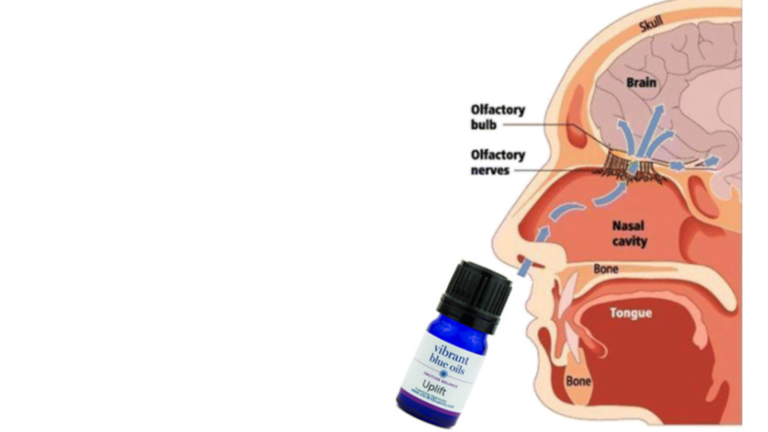Essential oils have been shown to help calm depression, in part due to their ability to access, and balance, the brain. Essential oils are able to travel directly to the area of the brain that impact mood.
Research has shown that smells are first processed by the olfactory bulb, which starts inside the nose and runs along the bottom of the brain. The olfactory bulb has direct connections to two brain areas that are strongly implicated in emotion and memory: the amygdala, which is often blunted in depressed persons as compared to non-depressed individuals, and the hippocampus. Your other 4 senses – sight, sound, touch and taste – do not pass through these brain areas which may help explain why essential oils help boost mood.
Professor Wayne Drevets outlines the amygdala’s importance to the neurobiology of depression in this video. Drevets notes that the “One of the structures in the brain that has been most closely associated with depression has been the amygdala. The amygdala has been known to be an important brain region in evaluating the emotional significance of different kinds of stimuli, including stimuli that might represent a threat or that might have social significance or that might have reward value.”
“The amygdala is overly active in people with depression when you show them sad stimuli, but under-active when you show them positive stimuli. You see evidence for this differential processing of positive versus negative stimuli in this structure in depression. The amygdala also plays a role then in organizing the emotional experience in expression… Abnormalities in depression resemble a state of excess of amygdala activity. Stress hormones are excessively secreted in depression revealing an imbalanced autonomic pattern associated with increased amygdala activity. Too much sympathetic activation results in a behavioral response of social isolation and feeling anxious/tense is also consistent with how one would respond with an overactive amygdala. Indeed in humans when neurosurgeons have stimulated the amygdala, they actually can elicit the whole range of emotional experiences that people with depression will describe.”
Additional research found that depressive symptoms were “significantly decreased” when the amygdala was trained to respond more strongly to positive memories.
Essential Oils for the Amygdala
The structural connections between the olfactory system and the brains limbic system, including the amygdala, entangles the perception of smell with emotional experiences, including depression. Essential oils can be used to stimulate your sense of smell and elevate positive activity in limbic brain structures, such as the amygdala, to help shift out of fear, fear memory and resulting emotional experiences like depression.
Research found that rose essential oil helped to significantly calm the amygdala in animal studies. Researchers speculated that “the flavonoids of Rosa damascena may act via GABA receptors as previous studies have proposed for flavonoids of other medicinal plants.”
READ THIS NEXT: Flavonoids for Brian Health
In addition, Nobel Prize–winning researcher Linda Buck found that Rose essential oil can counteract your brain’s fear response to predator odor. Her research found that smelling rose essential oil in the presence of predator odors (or other fear stimuli) can suppress your brain’s stress responses and hormonal signals, often triggered by the amygdala. This research gives some insight into how essential oils can influence your hormonal responses, by either suppressing or activating your brain’s hormonal responses to specific odors.
Uplift for Calming the Amygdala and Alleviating Depression
Uplift™ helps balance your energy, boost mood, alleviate depression, and promote feelings of strength, courage and protection. It also helps you align with greater health and intuition and supports optimal energetic alignment.
Uplift™ was specifically formulated with oils that assist in building courage, confidence, self-esteem and returning a sense of calm, joy and peace to our lives. It inspires hope in those who have temporarily lost their optimism and helps users to overcome their fear and reclaim their potential. When we have more courage to take on new things and/or change, we are better able to release old patterns that are not working for us.
Uplift™ is formulated from the following single oils:
Frankincense
Frankincense is an aromatic resin derived from the sap of trees in the Boswellia that can stimulate the limbic part of the brain to help elevate mood and release negativity and painful emotions.
Frankincense oil has also been shown to offer a natural solution for mild to moderate cases of depression. Frankincense contains the chemical constituent Incensole Acetate, which has been found to stimulate Transient Receptor Potential Vanilloid (TRPV3) channels in the brain that “may play a role in emotional regulation.” Research found this constituent of Frankincense to relieve anxiety and depression in animal studies.
Lavender
Lavender is known for its sedative, anxiety relieving and calming properties that help your body and mind relax. One study even suggested that lavender works as well as the anti-anxiety medication Lorazepam for calming anxiety.
Linalool, a key constituent of Lavender, has been shown to help with depression. Linalool is known to activate your calming neurotransmitter Gamma-Aminobutyric acid (GABA), which may slows and can balance brain activity and reduce symptoms of depression.
Research has found that essential oils, like Lavender™, can bind to the receptors on your cells that receive your body’s calming neurotransmitter, GABA, and help balance your brain’s level of excitation and inhibition which is vital for normal brain function and a healthy nervous system.
Scientists also concluded that inhaling Lavender essential oil can calm the nervous system and improve brain waves appropriate to a relaxed state. “Lavender oil caused significant decreases of blood pressure, heart rate, and skin temperature, which indicated a decrease of autonomic arousal. In terms of mood responses.”
READ THIS NEXT: How Essential Oils Regulate Your Mood
Rose
Known to balance heart function, relax, calm and soothe nerves, Rose essential oil also demonstrates strong stress management and anti-depressant qualities.
Research reveals the anxiolytic-like (anxiety reducing) properties of rose oil. “Inhalation of rose essential oil produced an anxiolytic-like effect similar to diazepam (a medication used for anxiety first marketed as Valium).
A study published in the journal Complementary Therapies in Clinical Practice correlated “significant improvements” in postnatal depression and anxiety.
Blue Tansy
Helps lift physical and mental stagnation, relieving congestion along with anger, anxiety, depression and nervousness agitation to help open your heart and move out energy that no longer serves you. On a physical level, it helps calm inflammation and neutralize histamine to calm allergic reactions. It helps enhance the properties of the other oils in the blend and will help you relax your mind and body.
Roman Chamomile
A natural anti-histamine, Roman Chamomile can help promote the health of your physical heart. Roman chamomile contains high levels of flavonoids, or plant secondary metabolites, that have been shown to significantly reduce mortality from coronary heart disease when taken internally.
The flavonoids present in Roman chamomile essential oil are believed to lower blood pressure and have a relaxing effect on the heart. On an emotional level, Roman chamomile essential oil has been used as a mild sedative to calm nerves and reduce anxiety by promoting relaxation.
A 2013 study published in Evidence-Based Complementary and Alternative Medicine found that an essential oil blend including lavender, Roman chamomile and neroli reduced anxiety levels and improved the sleep quality of patients in an intensive care unit compared to conventional nursing intervention. Similarly, a 2006 study found that inhaling Roman Chamomile essential oil promoted sleep with calmness and drowsiness among healthy volunteers. Inhalation of chamomile is believed to offset a stress-induced increase in the levels of adrenocorticotropic (ACTH) hormone, which is released by the pituitary gland to trigger the release of the stress hormone cortisol.
According to a 2005 study published in Biological and Pharmaceutical Bulletin, chamomile extracts exhibit benzodiazepine-like hypnotic activity. A significant decrease in the time it took to fall asleep was observed in rats who received chamomile extract at a dose of 300 milligrams per kilogram of body weight.
Red Mandarin
Mandarin essential oil acts as a relaxing agent for agitated nerves and reduces stress and emotional imbalance. Mandarin essential oil has been found to possess anti-anxiety and sedative properties and may help to relieve anxiety, depression, nervousness, and promote a healthy sleep. It can work as an instant mood booster, helping to switch off an overactive mind, promote relaxation and relieve nervous and muscular spasms.
Research tracking nurse-delivered aromatherapy as part of patient care found that mandarin essential oil showed “significant clinical improvements” in lowering anxiety. Mandarin is known to have numerous emotional benefits. It is regarded as being highly uplifting and blends well with several other essential oils.
Lime
Lime oil was found to be “more effective than antidepressants.” (Study). It clears trapped emotions and thoughts, helping to overcome stagnant energies – including grief, despair, apathy anxiety, depression, listlessness fatigue, overwhelm, or a heavy heart. Lime can help support clear boundaries, opening the door for happy, healthy, and heart-focused relationships. Further, the Lime oil can help promote emotional grounding, encouraging a balance between the heart and mind, the connection of which helps you ground.
Research has demonstrated that citrus oils, like Lime, help stimulate the production of glutathione, an antioxidant known to protect you against inflammation and reduce our chances of developing autoimmunity as well as normalize “neuroendocrine hormone levels and immune function.”
Ylang Ylang
Ylang ylang essential oil works directly on brain chemicals to reduce anxiety and depression.
Ylang Ylang is believed to balance the central nervous system, calm blood pressure and support mental relaxation, all of which help to calm depression nervousness. It has been also reported to have blood pressure lowering effect suggesting its potential use in managing hypertension.
Research has found Ylang Ylang “indeed possess sedative, relaxing, and also harmonization effects” and provides “relief of depression and stress.”
A study on The effects of the inhalation method using essential oils on blood pressure and stress responses of clients with essential hypertension found that inhaling lavender, ylang ylang, and bergamot oils once daily for four weeks reduced cortisol levels, psychological stress, and blood pressure in people with essential hypertension.
An additional clinical study concluded that both cortisol and systolic blood pressure declines after inhalation of a combination of lavender, ylang ylang, marjoram, and neroli oil in those with high blood pressure or pre-high blood pressure
Similarly, animal research found that ylang ylang essential oil and its major constituents (benzyl benzoate, linalool, and benzyl alcohol) reduce anxiety in mice, and modifies neurotransmitter levels (decreases dopamine in the striatum and increase serotonin in the hippocampus).
Apply 2 -3 drops of Uplift™ to the vagal nerve (behind earlobe, on mastoid bone) over heart, the base of your neck, wrists, temples and forehead. To keep balanced and confident during the day rub 3 to 6 drops on the bottom of your feet each morning.
It can also align the physical, mental and emotional energies of the body when applied to shoulders and/and feet.
To aid with depression and overcoming fear, apply 2- 3 times daily or as needed.
Featured Oil:
Ready to get started? Click the links below to order today:
References:
- https://www.sciencedirect.com/science/article/abs/pii/S0028393203002161
- https://dnalc.cshl.edu/view/2074-The-amygdala-and-depression.html
- https://pubmed.ncbi.nlm.nih.gov/28407727/
- https://pubmed.ncbi.nlm.nih.gov/18819571/
- https://www.nobelprize.org/prizes/medicine/2004/press-release/
- https://pubmed.ncbi.nlm.nih.gov/18492727/
- https://pubmed.ncbi.nlm.nih.gov/19962288/
- https://www.ncbi.nlm.nih.gov/pmc/articles/PMC6099651/
- https://pubmed.ncbi.nlm.nih.gov/22612017/
- https://www.sciencedirect.com/science/article/abs/pii/S0091305703003526
- https://pubmed.ncbi.nlm.nih.gov/22789792/
- https://draxe.com/health/coronary-heart-disease/
- https://pubmed.ncbi.nlm.nih.gov/8105262/
- https://www.hindawi.com/journals/ecam/2013/381381/
- https://www.sciencedirect.com/science/article/abs/pii/S0962456206000245
- https://pubmed.ncbi.nlm.nih.gov/15863883/
- https://pubmed.ncbi.nlm.nih.gov/27062964/
- https://pubmed.ncbi.nlm.nih.gov/8646568/
- https://www.ncbi.nlm.nih.gov/pmc/articles/PMC4534619/
- https://pubmed.ncbi.nlm.nih.gov/17211115/
- https://www.hindawi.com/journals/ecam/2012/984203/




